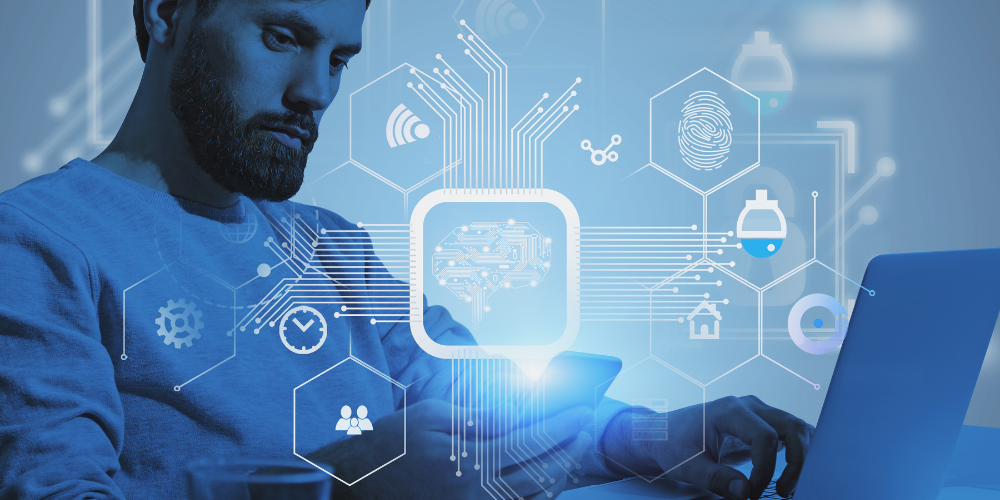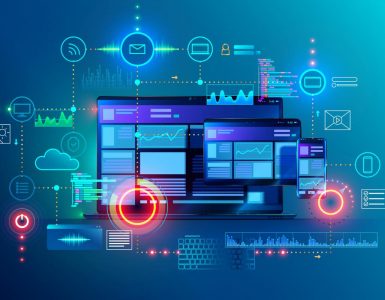The mobile app market is becoming increasingly competitive. Developers are experimenting with artificial intelligence and data science solutions to improve the customer experience. Everything has evolved and changed faster since the introduction of Artificial Intelligence.
Artificial Intelligence is at the heart of technological advancement and transformation. One of the areas where AI is driving the evolution of customer experience is app development.
Mobile apps have changed the world of computer science, especially with the presence of AI. AI applications in mobile apps aid in making user interactions more engaging and in learning more about customers. Image analysis, self-learning, security, and data processing are all examples.
Artificial Intelligence assists you in understanding your users’ previous shopping patterns. As a result, you can tailor your app to meet the expectations and needs of your users, increasing user engagement and retention. This allows you to differentiate yourself from your competitors and grow your business.
Artificial Intelligence and Machine Learning:
Machine learning (ML) is maturing, with a growing recognition that ML can play a critical role in a variety of critical applications such as data mining, natural language processing, image recognition, and expert systems. ML has the potential to provide solutions in all of these domains and more, and it is likely to become a pillar of our future civilization.
For instance, if you want your program to predict traffic patterns at a busy intersection (task T), you can run it through a machine learning algorithm with data about past traffic patterns (experience E), and if it “learned,” it will be better at predicting future traffic patterns (performance measure P).
There is a critical distinction between supervised and unsupervised learning among the various types of Machine Learning tasks:
Supervised machine learning – When a programme is “trained” on a predefined set of “training examples,” it improves its ability to reach an accurate conclusion when presented with new data.
Unsupervised machine learning – Unsupervised machine learning occurs when a programme is given a large amount of data and is required to find patterns and relationships within it.
Artificial intelligence is a field that combines computer science and large datasets to solve problems. It also includes the subfields of machine learning and deep learning, which are frequently mentioned in the context of artificial intelligence. Artificial Intelligence algorithms are used in these disciplines to create expert systems that make predictions or classifications based on input data.
Advantages of using Artificial intelligence and Machine Learning in Mobile Development:
App developers and marketers are getting a better understanding of user behavior. This results from actions, preferences, purchases, and so on.
Deep learning is a science that entails “teaching” machines to recognise these actions and then applying this “knowledge” to solve various complex queries. It enables us to investigate user behavior models. It also makes interaction with them more personalized and smooth.
- Quick Search –
Users today want to get the information they require as soon as possible. As a result, voice search is becoming more popular. Siri and Cortana have become valuable additions to general Internet search.
Voice search is evolving from voice recognition to voice understanding. Companies are getting closer to their goal of transforming voice search into “an assistant that helps you with your daily activities.”
Website optimisation for voice search is becoming increasingly important. It will soon be an essential component of user experience and search engine ranking.
- Quality User Experience –
Artificial intelligence improves the intuitiveness and personalization of user interactions in mobile apps. In mobile app development, AI-powered sentiment analysis can interpret a user’s emotions. It can comprehend his viewpoint on the product/service/information.
Furthermore, AI-infused technologies like NLP, image, and intelligent character recognition assist businesses in gaining customer loyalty. It accomplishes this by automating manual labor. For example, AI-powered OCR improves the efficiency and simplicity of banking apps.
- Enables to work for prolonged hours without sacrificing efficiency –
There are some rigorous tasks that require more time to complete, such as fuel investigation or mining processes. Smart robots that can be programmed to work for long periods of time without tiring can be created.
- Effective Communication –
Chatbots aid in the automation of communication between the mobile app and the user. Chatbots are learning to recognise and mimic emotions that are difficult to distinguish from human ones using artificial intelligence technology.
Chatbots are being used by an increasing number of online users to interact with mobile apps and websites. Because of the introduction of artificial intelligence, interacting with chatbots will be similar to interacting with a real consultant in a traditional store.
These are AI-powered bots that can interact with users in the same way that humans do. They gain knowledge from previous experiences. The basic idea is that if humans do not want to interact with other humans, they can use these chatbots.
- Enhance Daily Operations –
Mobile applications benefit significantly from Artificial Intelligence technology in terms of developing advanced features that simply eliminate the day-to-day risk and task of apps. This also improves the learning experience of developers, making the user happy.
For example, if the app is about travel, the user can use Artificial Intelligence to see different places and tourist destinations. This also aids in the intelligent discovery of medical tourism.
- Conversational UI –
With Artificial Intelligence in Mobile App Development, the CUI improves, resulting in much better app performance than before. You may have noticed a number of chatbots open in front of you that help with customer satisfaction. This allows clients to share their questions with their customers about what they require.
Let’s take a look at how Apple employs Artificial Intelligence and Machine Learning in each of these features:
- Handwriting Recognition –
If you have an iPad, you can use your Apple Pencil to recognise handwriting and identify English and Chinese characters.
From large amounts of typing data, the machine learning model can identify and translate strokes into ASCii source characters. Instead of handwritten copy, any text you write can be pasted into a document or searched online and converted to text.
- App Library suggestions –
You’ll find a folder in iOS’s new App Library layout that uses on-device intelligence to display suggestions of apps you’re likely to need next.
While this is a minor AI-powered feature, it is especially useful if you frequently use specific apps on a daily basis, as it becomes smarter the more you use your device.
- Handwashing –
Handwashing is an artificial intelligence (AI) feature in Apple Watch that detects when you wash your hands.
The feature allows your Watch to detect handwashing motions and sounds, triggering a 20-second countdown timer to ensure you wash your hands thoroughly. Your Watch will also alert you if you haven’t washed your hands within minutes of arriving home.
- Face ID –
FaceID technology generates a unique model of your face based on facial recognition patterns. This makes it easier to recognise your face and unlock or perform functions on your device.
FaceID is also available in the HomeKit-connected camera. This is where it saves facial recognition models and patterns in your devices to ensure that when someone rings the doorbell in front of your house, the camera can identify them.
FaceID in HomeKit also allows you to identify people and even call them by name by using photos that have been tagged on your device.
Examples of Organizations integrating Artificial Intelligence and Machine Learning:
Fyle-
Fyle is an expense tracking app powered by AI that is available for PC, Android, and iOS. Fyle is a major player in smart expense accounting, and it recently announced direct integration with Google G Suite and Microsoft Office 365.
Fyle is used by companies such as Royal Enfield and Communicorp because it provides useful features such as real-time data extraction, attempting to report operating expenses, business card tracking, real-time decision evaluations, compliance business processes, travel enhancements, travel requests, research, and integration with key transport management, HRMS, accounting, and ERP apps.
Amazon Web Services –
AWS offers AI services that make use of tools for a company’s applications and workloads. Their artificial intelligence services integrate with their infrastructure to assist businesses in addressing their recommendations, modernizing contact centers, security, and customer engagement. The service provides high-quality ML services in order to provide accurate APIs. AWS AI requires no prior knowledge of ML or AI, which is a great feature for businesses that are just starting to update their systems.
Microsoft Azure –
Microsoft offers both consumer-facing and business-facing AI projects. Microsoft sells a variety of AI services through its Azure cloud service, including bot services, machine learning, and cognitive services. Microsoft recently invested in OpenAI to strengthen their partnership and develop new AI technology. According to an OpenAI representative, “Azure’s unique architecture design has been critical in delivering best-in-class performance and scale for our AI training and inference workloads.”
Alibaba Cloud –
Alibaba, Asia’s leading cloud platform, provides clients with a sophisticated machine learning platform for AI. Notably, the platform provides a visual interface for ease of use, allowing businesses to drag and drop various components into a canvas to assemble their AI functionality. The platform also includes a plethora of algorithm components that can handle a wide range of tasks, allowing customers to use pre-built solutions.
Neurala –
Neurala claims to use AI technology to assist users in improving visual inspection problems. The Neurala Brain, a deep learning neural network software that makes devices like cameras, phones, and drones smarter and easier to use, is managed by the company. Artificial Intelligence consumes a lot of power, but the Neurala Brain uses audio and visual input in low-power settings to make simple devices smarter.
Flatiron Health –
Flatiron finds cancer research information in near real-time by mining health data using machine learning and drawing on a variety of sources. Before being acquired by cancer research behemoth Roche, the company raised more than $175 million in Series C funding.
KHealth –
In terms of health care, there is a gray area in our lives; we ask ourselves, “Does this problem I’m having really require making a doctor’s appointment, or could a large dose of simple information be enough?” This is where K Health’s AI solution comes in. Users can text a doctor or look up similar cases in their area, which has been especially useful for COVID-19. Its system provides assistance based on how a user’s complaint correlates with this vast history of other patients, using a model built from a vast store of anonymous health records. Consider K Health to be the cutting-edge of telemedicine.
AEye –
AEye develops the vision algorithms, computer vision strategy, software, and hardware used to guide self-driving cars. Its LiDAR technology concentrates on the most important information in a vehicle’s sightline, such as people, other cars, and animals, while ignoring other landscape features such as the sky, buildings, and surrounding vegetation. AEye has also agreed to merge with CF Finance Acquisition Corp. III.
Pony.Ai –
Pony.ai creates software for self-driving cars. Ex-Google and Baidu engineers founded the company because they felt the big companies were moving too slowly in this space. It has already completed its first fully autonomous driving demonstration and is now operating a self-driving ride-sharing fleet in Guangzhou, China, using cars manufactured locally. Toyota provided $400 million in funding to the company.
Nuro –
Nuro manufactures small self-driving electric delivery trucks for local deliveries like groceries or takeaway. Its founders have previously worked on Google’s self-driving car project Waymo. The company’s overall goal is to increase the value of robotics in everyday life.
CrowdStrike –
This cloud-based SaaS firm specializes in endpoint security. CrowdStrike’s Falcon platform, which uses AI, can identify what it calls active indicators of attack to detect malicious activity before a breach occurs. It provides network administrators with actionable intelligence of real-time findings, allowing them to take appropriate action.
Blackberry –
BlackBerry has acquired Cylance, an AI cybersecurity firm. The two collaborated to create security apps that prevent, rather than detect, viruses and other malware. Rather than operating from a blacklist or whitelist, BlackBerry Cybersecurity uses a mathematical learning process to determine what is safe and what is a threat. The company claims that its machine learning understands a hacker’s mentality and can predict their behavior.
The Trade Desk –
The Trade Desk, a company that helps digital advertisers run targeted digital advertising campaigns, uses AI to optimize its customers’ advertising campaigns for their target audiences. Their AI, Koa, was designed to analyze data from across the internet in order to determine what specific audiences are looking for and where ads should be placed to maximize reach and cost. The Trade Desk also allows you to launch your digital ads independently, but it uses artificial intelligence to provide performance recommendations while your campaign is running.
People.Ai –
People.ai’s goal is to make salespeople’s lives easier by assisting them in entering reams of small details into relevant CRM systems, primarily Salesforce. Consider all of the annoying information bits from texting, your calendar, and endless Slack conversations — the company intends to assist you with all of that. Furthermore, the system attempts to coach sales representatives on the most effective time management techniques.
Icertis –
The amazing thing about AI is that it is constantly moving up the food chain in terms of the sophisticated tasks it can handle. Icertis, which has been in business for over a decade, handles millions of business contracts using a method known as contract intelligence. The company’s solution, which makes use of the cloud, automates certain tasks and scans previous contract details. The company has gained some significant clients, including Microsoft, and has been named a Gartner leader.
DocuSign –
DocuSign, a well-known contract technology company, uses e-signature technology to digitize the contracting process across a wide range of industries. Many users are unaware of some of the AI features that DocuSign offers, such as AI-powered contracts and risk analysis before you sign. This AI process makes contract negotiations and/or renegotiations more efficient.
Nvidia –
Nvidia’s rise to the top of the AI industry did not happen overnight. For nearly two decades, it has promoted its CUDA GPU programming language. AI developers have embraced Nvidia GPUs for machine learning and artificial intelligence after seeing the value in the GPU’s massively parallel processing design.
HighRadius –
HighRadius, based in Houston, is a finance AI platform that assists many large companies around the world in transforming their cash, treasury, and records. Within six months, HighRadius works to deliver measurable business outcomes for working capital optimisation, debt reduction, shortened month-long timelines, and increased employee productivity.
Iris.Ai –
Iris.ai assists researchers in sorting through cross-disciplinary research to find relevant information, and the tool learns how to return better results as it is used more frequently. Many people have tried the service since its launch, with some becoming regular users. Its Iris.ai release includes the Focus tool, an intelligent mechanism for refining and collating a reading list of research literature, saving a significant amount of time and effort.
Deepmind –
Deepmind, which was acquired by Alphabet, is a research firm that focuses on AI research, with topics ranging from climate change to healthcare and finance. Its goal is to create “safe” AI that improves its problem-solving abilities over time. The company is based in London and heavily recruits from Oxford and Cambridge, which are Europe’s leading universities for Artificial Intelligence and Machine Learning research.
OpenAI –
OpenAI is a nonprofit research organization that operates on an open-source model, allowing other institutions and researchers to freely collaborate while making its patents and research available to the public. According to the founders, they are motivated in part by concerns about the existential threat posed by artificial general intelligence. ChatGPT is a new OpenAI feature that allows users to generate text ranging from poetry to short stories. Despite the fact that OpenAI is a non-profit, ChatGPT is now its own for-profit company.
Siemens –
Siemens, headquartered in Munich, focuses on areas such as energy, electrification, digitalization, and automation. They also work to develop resource-saving and energy-efficient technologies and are a leading provider of medical diagnostic, power generation, and transmission devices and systems. “AI at the beer garden,” according to the Siemens website.
CloudMinds –
CloudMinds is a company that specializes in AI cloud robotics. CloudMinds, based in Irvine, California, uses cloud AI to create humanoid robots that can benefit both businesses and average households. CloudMinds has set a goal of creating affordable robots for customers and reaching out internationally to help people and markets all over the world by 2025.
Qualcomm –
Qualcomm, which manufactures highly capable smartphone chips, is driving the AI revolution by utilizing a signal processor for image and sound capabilities. Qualcomm acquired NUVIA, a competitive CPU and technology design firm, enhancing future CPU opportunities. Given its market size and power, Qualcomm is likely to remain a key driver of AI functionality in the critical consumer device market.
Discord –
Discord, a gaming chat app, has acquired Ubiquity6, an augmented reality startup. Ubiquity6 has created a mobile app that allows multiple people to experience augmented reality (AR) at the same time. Users see and interact with objects presented by the Ubiquity app’s fully dimensioned visual world, immersing themselves in a creative or educational environment.
Facebook –
While Facebook is undoubtedly better known in other areas as one of the world’s largest social media networks, the company is making significant advances in its AI capabilities, particularly in self-teaching for its news feed algorithms. Most notably, the Facebook team has begun using AI to screen posts for hate speech, fake news, and potentially illegal behavior.
Conclusion:
Every year, technology advances to greater heights, with new use cases emerging that raise the bar for organizations worldwide. AI and machine learning have influenced iOS app development by shifting the emphasis from search mechanisms to user personalization and customization.






Add comment